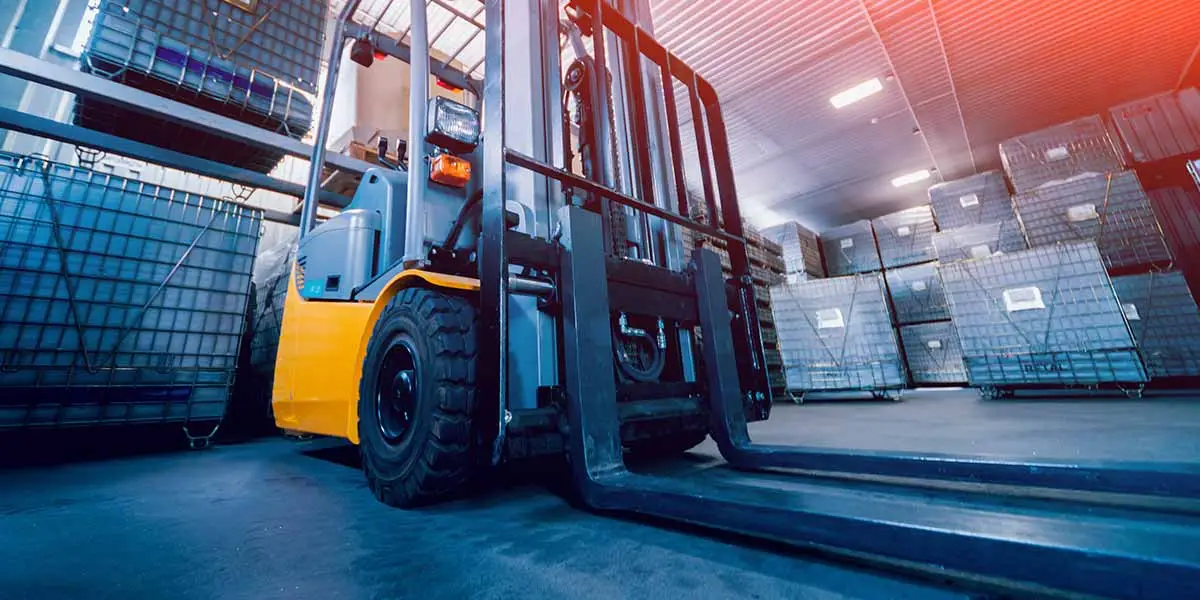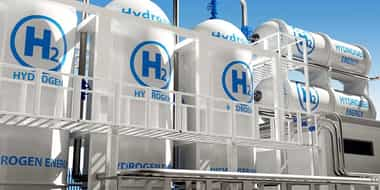
Aug 4, 2023
Blog Energy & Sustainability , Digital World 7 key advantages of fuel cell forklifts
Fuel cells are primed to take over the world of energy, having already replaced gasoline and diesel in powering electric vehicles. Being leaps more efficient than conventional technologies, the material handling industry is also now benefiting from fuel cells to power forklifts. While traditional battery-powered forklifts need between 3-5 hours to recharge, fuel cell forklifts require just 2-3 minutes.
Evidently, fuel cell-powered forklifts offer industries huge amounts of benefits. Today, we’re diving into seven key advantages that the technology offers.
About 70% of any warehouse’s costs are spent on labor. According to industry experts, the productivity of a warehouse can be increased by nearly 15% by using fuel-cell vehicles. This is due to the time saved refueling, the high operational speeds, and the fact fuel cells are eco-friendly.
In an automotive warehouse operating 24/7, the average per-minute profit is around $7,000. So, one tiny delay in the warehouse operation could mean a loss of $7,000. Using the fuel cell forklift in a warehouse can increase the uptime as well as the production capacity.
The operational speed of fuel cell forklifts is almost constant, whether it has 20% fuel or 100% fuel in the tank. While the lead-acid battery can lose its output up to 14% in one shift in normal temperatures, in a cold or freezer storage facility that jumps to between 25% and 50%.
Fuel cell-powered forklifts are highly efficient for multi-shift working environments as they can run a long time after a single fuel. They require far less time to refuel compared to conventional and battery-powered forklifts. Although investment costs for lead-acid battery-powered forklifts are relatively low compared to fuel cell forklifts, there are many associated costs with conventional batteries. Battery acid overflow due to severe heat in the battery can entail extra costs, and li-ion battery is also a high-cost option, as these are rechargeable and require a battery changing station nearby to the plant. Still, the charging girds can charge a fixed amount of battery at a single time. The consequence is that the operational time of a forklift can be delayed.
All though fuel cells can be expensive up-front, the cost of hydrogen and its infrastructure will reduce as the adoption rate increases. Many companies are working on hydrogen-as-a-fuel since they have found that they can get financial support from the government for their work, and it will also help in the development of new infrastructure for a hydrogen fuel cell for warehouse applications. Furthermore, the cost of investment in hydrogen fuels is relatively less costly in the long term than developing an infrastructure for battery change, as this infrastructure requires a massive amount of money, in the form of copper wire, battery watering, maintenance equipment, and space-consuming racks.
Electricity prices are climbing due to low production and high demand. Lead-acid battery charging represents 25% to 30% of a distribution center’s electricity usage and approximately 50% of the peak demand charges, due to the spike in electricity usage when batteries are charged. Lithium batteries rely on opportunity charging, which leads to increased electricity usage and rates. Fuel cell forklifts could be the best solution for reducing the electricity consumption and the electricity can be used for some other material handling applications.
Fuel cell forklifts will further make their mark in warehouses and industry. Discover the outlook for this emerging trend with BCC Research’s report on the global fuel cell forklift market.
Fuel cell forklifts can work at extreme temperatures without losing power and efficiency. While lead-acid battery-powered forklifts can work around eight hours at 25 degrees Celsius, in an extremely cold environment they can lose around 50% operational speed, and can therefore only work up to four hours in these conditions. Similarly, the Li-ion battery can lose 20% performance in an extremely cold environment.
The difference is dramatic to cold storage professionals — hydrogen fuel cells are not affected by cold operations, and they can run up to twice as long per fill-up compared to battery-powered units. This allows operators to stay productive moving goods around longer, as fuel cell-powered forklifts can remain in the cold storage facility for longer periods of time.
Fuel cell forklifts do not require any battery room for replacing or swapping of batteries, resulting in more space in a warehouse for additional business activity.
The fuel cell forklift emits only water from its tailpipe and heat from its engine. Fuel cell forklifts do not require any battery room for replacing or swapping of batteries, resulting in more space in a warehouse for additional business activity. Using the fuel cell battery means there is no need to spend money on handling and storing toxic battery materials, by which greenhouse gas emission can be reduced by 80%. Hydrogen is used safely in many different industries, including food manufacturing (hydrogenation), food production (ammonia in fertilizer), welding, cryogenics, weather balloons, oil refining, household use as hydrogen peroxide and fuel for transportation and stationary power.
As hydrogen becomes a viable option for commercial industries the infrastructure for hydrogen is sprawling, resulting in a decline in the price of hydrogen.
Consider becoming a member of the BCC Research library and gain access to the entire scope of reports within our Fuel Cell and Battery Technologies category. Get in touch today to find out more.

Olivia Lowden is a Junior Copywriter at BCC Research, writing content on everything from sustainability to fintech. Before beginning at BCC Research, she received a First-Class Master’s Degree in Creative Writing from the University of East Anglia.

Electrical switches—devices that control the flow of electricity—are the backbon...

As the world accelerates toward net-zero emissions, hydrogen, and ammonia have e...

Hydrogen technology is widely used across industries like glass, fertilizer, met...

We are your trusted research partner, providing actionable insights and custom consulting across life sciences, advanced materials, and technology. Allow BCC Research to nurture your smartest business decisions today, tomorrow, and beyond.
Contact UsBCC Research provides objective, unbiased measurement and assessment of market opportunities with detailed market research reports. Our experienced industry analysts assess growth opportunities, market sizing, technologies, applications, supply chains and companies with the singular goal of helping you make informed business decisions, free of noise and hype.